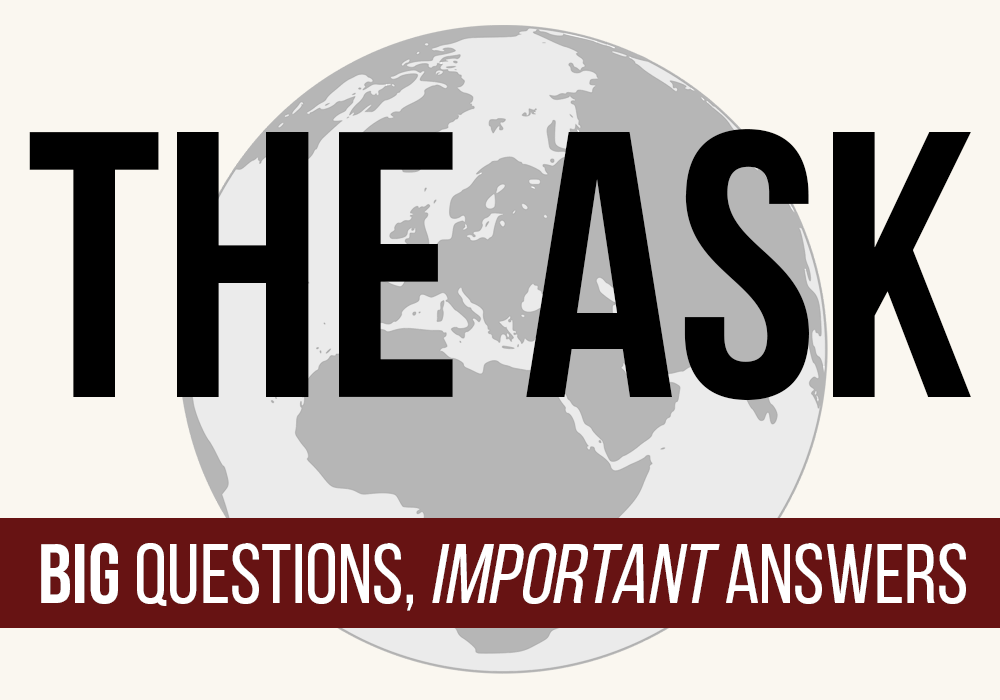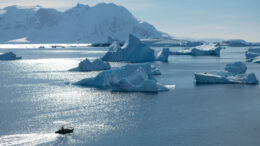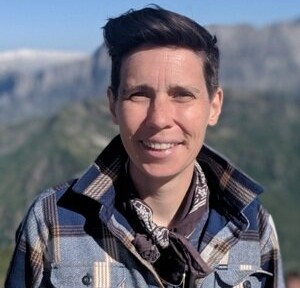Emily Cunningham could hear the sounds of whales breathing and the creaking of ice. The marine biologist — bursting with excitement — had just arrived in Antarctica aboard an expedition ship but found the peninsula cloaked in fog. As she set out in a small Zodiac boat to test some scientific equipment for the next day’s work, the fog slowly lifted, unveiling spectacular beauty.
“It felt like Antarctica wasn’t quite ready to reveal herself,” says Cunningham. “And then all of a sudden, she showed off in all her glory.”
Cunningham, co-founder of the Motion for the Ocean initiative that supports local ocean conservation efforts, would spend the next six months aboard a ship in Antarctica teaching science to visitors and helping inspire them to advocate for Antarctic conservation and engage in climate action.
After she returned to her home in the United Kingdom this spring, The Revelator spoke to her about balancing tourism with conservation, how wildlife in Antarctica are coping with climate change, and what global efforts are needed to protect the ocean.
What were you doing in Antarctica?
I was working on board an expedition ship that takes paying guests to Antarctica. We arrived there in October. We have a resident science team on board, of which I’m a member, and then we also have visiting researchers from institutions around the world. My job was citizen science coordinator, which involves developing ways to engage the guests with the scientific research in an authentic, hands-on way.
We have a study looking at the effect of melting glaciers on the phytoplankton populations that’s led by Scripps Institution of Oceanography and Universidad Nacional de La Plata in Argentina. We have our own project in collaboration with the Norwegian Institute for Water Research looking at the presence of microfibers in seawater in Antarctica. Then there’s a project that the chief scientist on my ship developed this year looking at the effect of penguin colonies on nearby fish populations using a remotely operated vehicle.
And I developed a project which I called Extreme Citizen Science. We’ve got two submersibles on board. The guests go in the submersibles and take photos for us to develop a baseline understanding of the seabed communities at a number of sites we go to multiple times over the season.
Join Dr @DanielMMoore_ and myself on an underwater survey in Antarctica 🤩
What will we find? 🤔
Spoiler alert: 🐧 pic.twitter.com/4CpwynUdoj
— Emily G Cunningham (@EG_Cunningham) March 9, 2023
How do guests react to these science projects?
It’s a real spectrum. Some people chose this trip specifically because they wanted to get that hands-on experience and came after they had really done their homework. And then you get people who just thought it looked cool and didn’t realize that there was any science happening at all — they wanted to go in a submersible, or they just wanted to see penguins — but they didn’t really know a lot about Antarctica.
I designed the program to be accessible to everybody, no background in science needed. We do three to four lectures a day. There’s workshops all the time. It’s very educational. I would hope that everybody left knowing more than when they came. And often the people who ended up enjoying it the most were the ones who had no idea about the science projects or perhaps took some convincing to participate.
Over the course of a 10-day trip you really get to know people and see how their mindsets are shifting from perhaps just thinking that this is a nice thing to do, to then genuine awe and genuine concern.
The program is designed to balance understanding what stands to be lost, but also empowering them. So when they go home, they have some citizen science projects or some actions they can do.
What’s the balance of getting people to understand the gravity of what’s happening in Antarctica but not having too many visitors that it’s further imperiled?
That’s a really big one that I struggled with. I have some concerns about mass tourism, mass cruising to Antarctica. I decided I needed to go and see it with my own eyes to really understand it and form an opinion.
The rate at which the industry is growing is deeply concerning to me. There were 100,000 visitors this season, and it’s likely to continue to increase. Most companies are commissioning more ships at the moment. The rule is that if you have more than 500 passengers, you can’t land your guests. But even our ship with nearly 400 passengers, that’s a lot of people. Some of the sites will have two ships a day visiting. Penguin colonies throughout the most important time of the year have visitors traipsing through from dawn till dusk.
From what I saw, it was well regulated and responsibly delivered. But I would be concerned if it got much bigger. And there’s lots of things related to mass tourism that aren’t necessarily visible: the carbon footprint, the consumerism, the impact from the soot of the engines on the snowmelt and lots more.
Like you say, it’s the balance. How many of those thousands of visitors feel inspired and want to go home and do something? I think we need to understand whether people go away and actually change their behavior. I’m still forming my thoughts on the Antarctic tourism industry because I really see both sides of the coin, but it has to continue to be very strictly regulated and it does concern me if it continues to grow at the pace that’s projected.
What environmental changes did you see?
When I got to dive in our submersible as part of the seabed studies, it’s the most incredible thing I’ve ever had the privilege to do. I didn’t really know what to expect. I’ve seen pictures, I’ve seen survey transacts, but they don’t prepare you for what it looks like to be able to see a seascape.
It’s just a sight to behold. It’s a living carpet, just full of color and life. Everywhere you looked, there were soft coral sponges, all different colors. There are sea spiders the size of your hand. And seeing all that and then realizing that this incredible seascape, which has evolved over millions of years, is going to change in my lifetime because of warming …
The Antarctic peninsula is warming five times faster than the global average. And with that warming, we’re seeing an increase in invasive species.
We have found microfibres (small plastic fibres) in EVERY SINGLE SAMPLE we have taken in Antarctica as part of our microplastics project.
This important research from @BAS_News shows how prevalent microplastics are in the Southern Ocean. https://t.co/mlTn2OqLER
— Emily G Cunningham (@EG_Cunningham) March 29, 2023
We talked about the increasing number of ships for tourism and other purposes — those are also going to increase that invasion risk. There’s research that connected Antarctica to 1,500 ports around the world because of refueling, et cetera. There’s a lot of nooks and crannies on ships that things can stow away in.
Another [climate-induced change] is the starving penguin chicks. The last two years we’ve had much later snow than usual. The snow is falling later into the spring. The penguins should be laying in late November, early December, but most of the sites were still covered in snow. So they can’t lay their eggs. By the time the parent penguins come to molt towards February time, the chicks aren’t fledged because they’ve had to lay so late. If the parents are molting they can’t get wet, so they can’t go and forage.
So you have starving penguin chicks. The parents can’t do anything about it. Reading about a starving penguin chick is very different from watching a starving penguin chick. With all these things I think, “I’m a scientist, I should be able to decouple myself from this thing.” But of course you can’t. And when you know that it’s something that is anthropogenically driven, it’s even harder to bear.
When people want to take action, what do you tell them?
We talk about climate change, the effects that it’s having on the ocean and Antarctica. Climate action is key to a lot of what we talk about to our guests and we explain that it’s not in the distance, it’s something that needs to happen now.
We try to empower people to use their voice to protect this incredible place, even if sometimes it takes being uncomfortable to do so.
For me personally, I realized I needed to take every opportunity to try and spread the word and use this experience to try and raise awareness. Antarctica can feel very far away. But there are things that you can do personally or in your own community — local action, national action —that will have relevance to Antarctica.
Because what happens in Antarctica is going to affect us all. A campaign I’ve been running for a long time is something called the Motion for the Ocean. It’s an initiative to help local governments step up and play their part in recovering the health of the ocean.
It renewed the importance of that kind of “act local, think global” mindset to tackling these kinds of problems. I’m trying to piggyback off the interest in Antarctica to try and get better local action here in the UK and offering that as a blueprint for other places in the world as well.
What would you like to see at the global level for ocean protection?
I’m excited about the United Nations Plastics Treaty. We need to shift the thinking around plastics. We need to design out the waste before it’s created and think about the whole life cycle of an item. If the plastic treaty can get that right, I think that’s going to be game changing for the plastic pollution problem all around the world.
We found plastic on the seabed in Antarctica and I just cried because, if it’s there, it’s everywhere. I’ve been down in the submersible and seen huge clouds of krill, and then I think, well, there’ll be microfibers in the krill. If they’re in the krill, then they’re in those penguins that had been walking around my feet yesterday and then they’re in those seals that I’m seeing lounging on the ice flows, and they’re in the whales that are swimming past.
You can’t get away from it.
And then there’s the High Seas Treaty, which is at the ratification stage. It could also be game changing. But I’m holding my judgment until we get a little bit further down the line.
There’s lots of things I think that are giving me hope at the moment, but we have to make sure they’re actually effective rather than just a sound bite.
I also think we need a moratorium on deep-sea mining until we know more. We’re running before we can walk. A lack of good governance should not be a reason to proceed with something. It should be the reason not to proceed with something.
If I had one wish with a genie, it would be a moratorium on deep-sea mining.
Previously on The Revelator:
Action for Antarctica: Saving the World’s Last Great Wilderness


